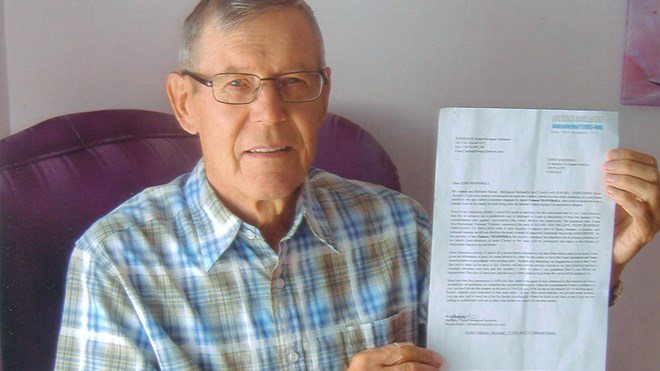When going through some old papers recently, Eero Mansikka came across a scam letter he received in the mail in December 2012.
Because it was sent by mail instead of email, Eero said he's concerned it's targeting his fellow seniors, who are less likely to use computers. He decided to contact the media to bring attention to the issue.
“They're just sending letters here and there, and hoping somebody's going to be silly enough to send something,” Eero said. “I think some people might, seniors especially.”
The letter, which is personally addressed to Eero, said it's from “Barrister Rafael Berdaguer Barbadillo,” who works with Rafael Asociados in Spain.
It said a man named Tomasz Mansikka had passed away, and had deposited $10.8 million with a safe security company in Spain.
The letter said the lawyer had searched for a family member, to no avail, and so Eero is being asked to stand in as next of kin, as he has the same last name.
“Once the consignment (vault) is released to you, we shall divide the content in the ratio of 50 per cent for you and 50 per cent for me as our benefit ($5.4 million each).”
Eero said a friend from Parry Sound, Ont. received a similar letter about three months ago. He said he recently brought the letter to Greater Sudbury Police, and they said they've had reports from other people who have received the letter.
Const. Meghan O'Malley of the Greater Sudbury Police said the letter is a variation of an “inheritance fraud.”
“Inheritance fraud is when a fraudster claiming to be overseas sends a letter, saying a person sharing your family name has died, and left a vast amount of money behind, and they're asking for your co-operation,” she said.
“So obviously, nobody should be responding to that letter. They shouldn't be clicking on any links if there's an email link provided. It may start off where the fees initially are small, and they may continue to ask for more and more money.
“But it definitely is a scam or a fraud, and people should never, ever give any credit card information or any personal information to anybody who's claiming they have an amount of cash to give you.”
Join Sudbury.com+
- Messages
- Post a Listing
- Your Listings
- Your Profile
- Your Subscriptions
- Your Likes
- Your Business
- Support Local News
- Payment History
Sudbury.com+ members
Already a +member?
Not a +member?
Sign up for a Sudbury.com+ account for instant access to upcoming contests, local offers, auctions and so much more.
